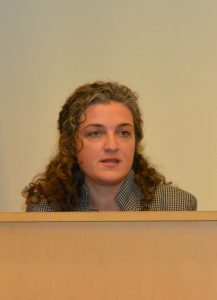- About Ramapo
- Academics
- Admissions & Aid
- Student Life
- Athletics
- Alumni
- Arts & Community
- Quick Links
- Apply
- Visit
- Give
MIT PROFESSOR AND AUTHOR ADDRESSES ARMENIAN LIFE IN POST-GENOCIDE TURKEY
(PDF) (DOC) (JPG)February 1, 2017
MAHWAH, N.J. – Dr. Lerna Ekmekcioglu, McMillan-Stewart Associate Professor of History, Massachusetts Institute of Technology spoke about her recent book Recovering Armenia: The Limits of Belonging in Post-Genocide Turkey on November 29 under the auspices of the Gross Center for Holocaust and Genocide Studies.
The book follows the trajectories of the survivors of the 1915 Armenian Genocide who remained inside Turkish borders after the signing of the 1918 Mudros Armistice (and during the Allied occupation years of Istanbul) and after the 1923 establishment of the new country as the Turkish Republic. How did the Kemalist state treat the remaining Armenians? What were Armenians’ responses to the new (but also old) Turkish regime? Dr. Ekmekcioglu discussed multiple strategies Armenians improvised in order to cohabit with unapologetic perpetrators and survive in the new Turkey.
 She gave voice to the community’s most prominent public figures, notably Hayganush Mark, a renowned activist, feminist, and editor of the influential journal Hay Gin. Sustained through gendered differences, Mark articulated an “Armenianess” that showed how women came to play a central role through preserving traditions, memory, and the mother tongue within the home.
She gave voice to the community’s most prominent public figures, notably Hayganush Mark, a renowned activist, feminist, and editor of the influential journal Hay Gin. Sustained through gendered differences, Mark articulated an “Armenianess” that showed how women came to play a central role through preserving traditions, memory, and the mother tongue within the home.
Lerna Ekmekcioglu is a U.S.-based historian of the modern Middle East and an affiliate of the Women and Gender Studies Program as well as the Center for International Studies. She specializes in Turkish and Armenian lands in the 19th and 20th centuries. Her work focuses on minority-majority relationships and the ways in which gendered analytical lenses help us better understand coexistence and conflict, including genocide. She holds a B.A. from Bogazici University (Istanbul) in Sociology, and a Ph.D. in History and Middle East and Islamic Studies from New York University, 2010. With Melissa Bilal, she also co-edited Bir Adalet Feryadı: Osmanlı’dan Cumhuriyet’e Beş Ermeni Feminist Yazar (1862–1933) [A Cry for Justice: Five Armenian Feminist Writers from the Ottoman Empire to the Turkish Republic (1862–1933)] (Istanbul: Aras Publishing House, 2006).
E-News Archives
| 2023 | 2022 | 2021 | 2019 | 2018 | 2017 | 2016 | 2015 | 2014 | 2013 | 2012 | 2011 | 2010 | 2009 | 2008 | 2007 |Copyright ©2024 Ramapo College Of New Jersey. Statements And Policies. Contact Webmaster.

Follow Us!